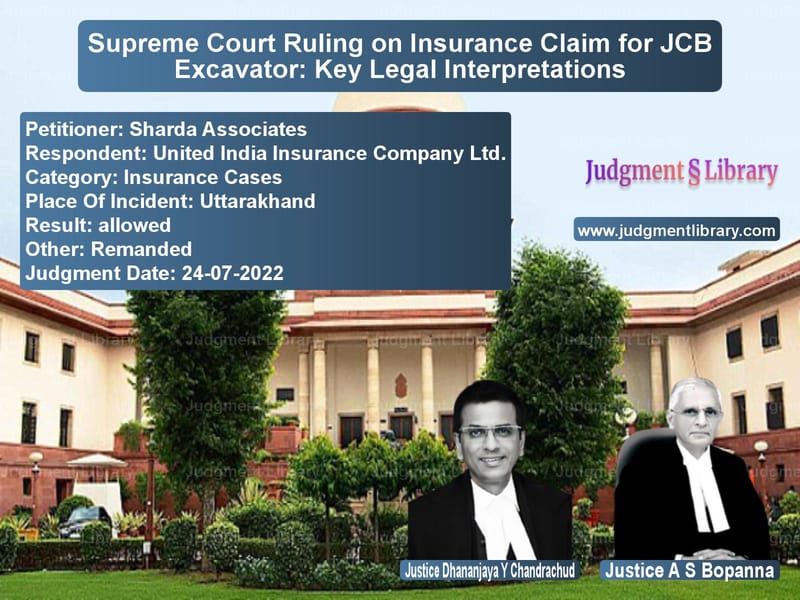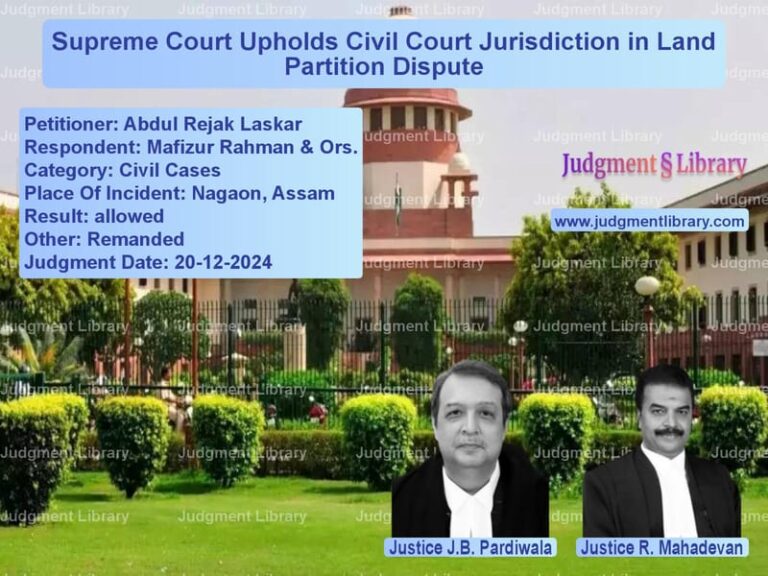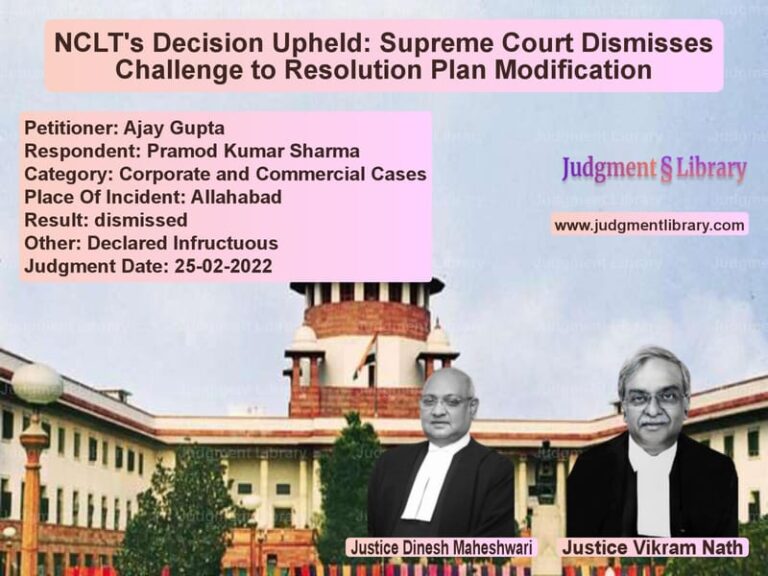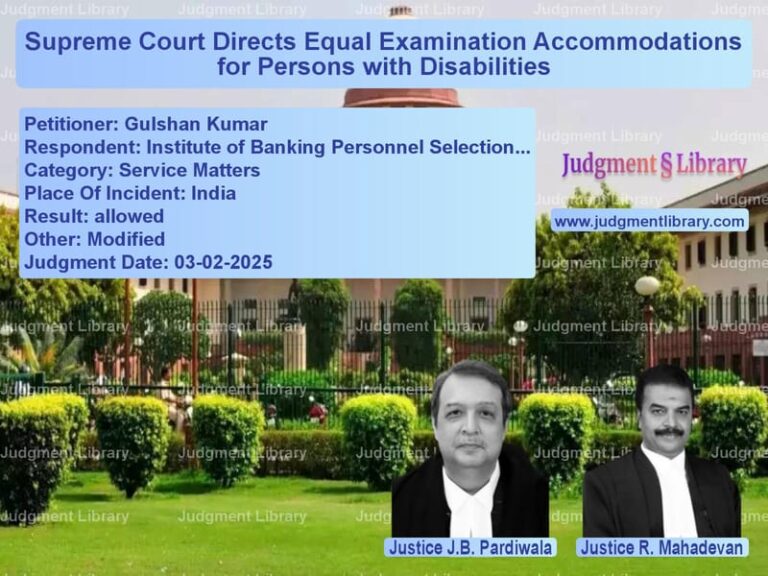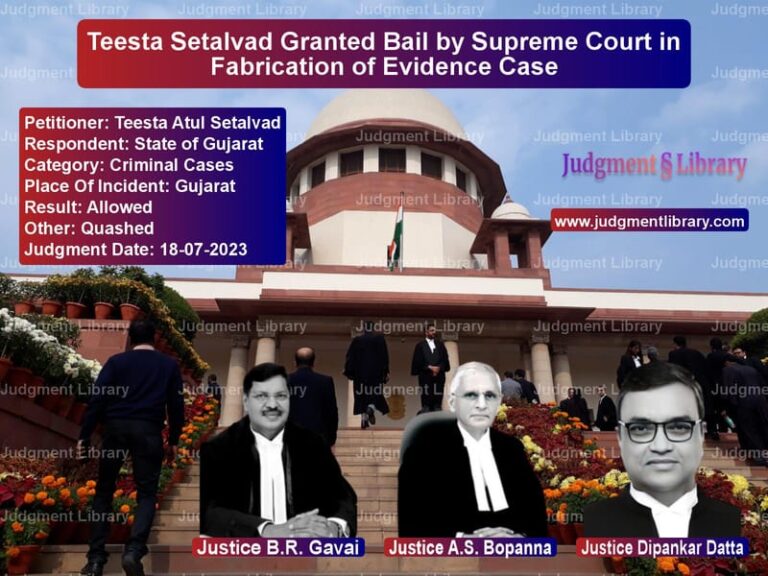Supreme Court Ruling on Insurance Claim for JCB Excavator: Key Legal Interpretations
The Supreme Court of India recently delivered a crucial judgment regarding an insurance claim dispute involving a JCB Excavator. The case revolved around whether the overturning of the machine during road construction work was covered under the insurance policy. The ruling has significant implications for insurance claims in cases where heavy machinery is used both as a vehicle and a tool.
Background of the Case
The appellant, Sharda Associates, had purchased a JCB Excavator Model 3DX and insured it with United India Insurance Company Ltd. for the period from March 5, 2009, to March 4, 2010, with an Insured Declared Value (IDV) of Rs 13.50 lakhs. On May 25, 2009, while being used on the Shivpuri-Timli Road in Uttarakhand, a portion of the road collapsed, causing the excavator to fall into a deep ditch, leading to the total loss of the machine and the death of the operator and helper.
Despite a First Information Report (FIR) confirming the accident was due to sudden road collapse, the insurer refused to settle the claim. The insurer cited Indian Motor Tariff (IMT) 47, arguing that the excavator was being used as a ‘tool of trade’ and that additional premiums were required for such usage.
Arguments of the Petitioner (Sharda Associates)
- The accident was caused by a landslide or sudden collapse of the road, not due to the overturning of the vehicle during operation.
- The insurer’s claim that IMT 47 applied was incorrect, as the JCB was being used as a whole machine and not as a tool.
- The repudiation of the claim was unjustified, given that the insurance policy covered damage due to landslides.
- The claim was initially approved by the District Consumer Disputes Redressal Forum and the State Consumer Disputes Redressal Commission (SCDRC), which found the insurer’s refusal to be unjustified.
Arguments of the Respondent (United India Insurance Company Ltd.)
- IMT 47 specifically excludes claims for overturning if the machine is used as a tool unless additional premiums are paid.
- The excavator was being used for road construction when the accident occurred, making it a ‘tool of trade’ rather than a vehicle.
- The survey report confirmed that the accident was due to the edge of the road collapsing, and therefore, the claim was not covered.
- The NCDRC correctly overturned the decisions of the lower forums by interpreting IMT 47 strictly.
Supreme Court’s Observations
The Supreme Court critically analyzed the applicability of IMT 47 and the findings of the National Consumer Disputes Redressal Commission (NCDRC). Key observations included:
- IMT 47 applies only when overturning results from the machine being used as a tool. However, in this case, the accident was caused by a sudden collapse of the road, which is a covered peril.
- The lower forums (District Forum and SCDRC) correctly found that the excavator was being used as a whole and not merely as a tool.
- The NCDRC overstepped its revisional jurisdiction by reappreciating facts rather than limiting its scope to legal questions.
- The insurer’s interpretation of IMT 47 was too rigid and did not consider the broader policy coverage for natural calamities like landslides.
Legal Precedents Considered
- Oriental Insurance Co. Ltd. vs. Meena Variyal (2007): Reiterated that insurance policies must be interpreted in a manner that does not defeat the legitimate expectations of the insured.
- United India Insurance Co. Ltd. vs. Pushpalaya Printers (2004): Held that exclusions in insurance policies must be applied strictly and should not lead to unjust denial of claims.
- Lourdes Society Snehanjali Girls Hostel vs. H&R Johnson (India) Ltd. (2016): Clarified that the revisional jurisdiction of NCDRC must not be exercised to interfere with concurrent findings of fact unless gross misinterpretation of law exists.
Supreme Court’s Verdict
The Supreme Court ruled in favor of the appellant and set aside the NCDRC’s order, restoring the decision of the SCDRC. The insurer was directed to pay Rs 13.50 lakhs along with interest at 7% from the date of the consumer complaint.
Implications of the Judgment
- Insurance Claims Interpretation: The ruling reinforces the principle that insurance contracts must be interpreted in a manner that favors coverage rather than exclusions.
- Consumer Rights Protection: Highlights the importance of fair compensation in insurance claims and the need to prevent arbitrary claim denials.
- Judicial Review in Consumer Cases: Limits the revisional power of NCDRC to legal errors rather than factual reevaluation.
- Precedent for Heavy Machinery Insurance: Sets a precedent for cases involving insurance coverage for construction equipment.
This landmark judgment ensures that insurers do not use technicalities to evade liability, reinforcing fair practices in consumer insurance litigation.
Petitioner Name: Sharda Associates.Respondent Name: United India Insurance Company Ltd..Judgment By: Justice Dhananjaya Y Chandrachud, Justice A S Bopanna.Place Of Incident: Uttarakhand.Judgment Date: 24-07-2022.
Don’t miss out on the full details! Download the complete judgment in PDF format below and gain valuable insights instantly!
Download Judgment: sharda-associates-vs-united-india-insuran-supreme-court-of-india-judgment-dated-24-07-2022.pdf
Directly Download Judgment: Directly download this Judgment
See all petitions in Motor Insurance Settlements
See all petitions in Compensation Disputes
See all petitions in Damages and Compensation
See all petitions in Consumer Rights
See all petitions in Judgment by Dhananjaya Y Chandrachud
See all petitions in Judgment by A. S. Bopanna
See all petitions in allowed
See all petitions in Remanded
See all petitions in supreme court of India judgments July 2022
See all petitions in 2022 judgments
See all posts in Insurance Cases Category
See all allowed petitions in Insurance Cases Category
See all Dismissed petitions in Insurance Cases Category
See all partially allowed petitions in Insurance Cases Category

